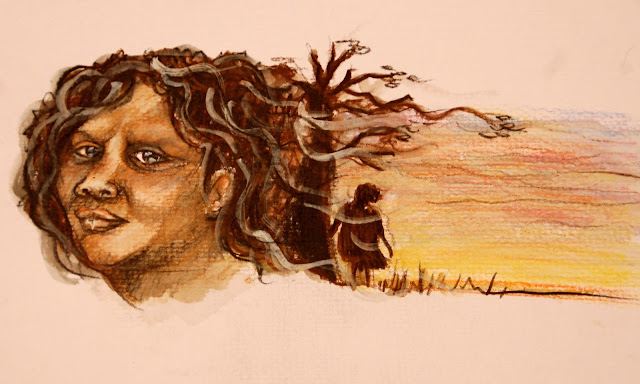We are killing our medicine women
 | ||
| Illustration by Kate Gillett |
‘To record is to resist evil; to forget is to permit its spread.’
- Roger Cohen
A month ago a woman died. I wrote about her in a previous blog, I said ‘Her name is Neela and she is painting my sky.’ (White-privilege-is-robbing-us-blind)
I knew her for only one afternoon because the next time I visited her she was already dying.
She had a wound that turned septic and her already failing heart struggled to deal with the infection.
It sounds simple, but it isn’t. Neela was a big woman, vast and voluminous in her presence: an artist, a Law woman, a bush medicine practitioner. She was of course, an Aboriginal woman, and this means an awful lot of things.
This means that when she spoke with another person, she practiced a kind of deep listening unknown to most non-Indigenous people. It meant she listened with her entirety. She did not begin to formulate her own answer until the other had completely finished speaking. She let their words settle like sediment. Only when it had landed within her did she begin to consider her response. She converted her language into English words; She spoke softly and slowly. It was the kind of speech that if you were truly listening with your own entirety, you felt it as vibrations parting molecules of air and slipping in through your cells. She would meet your eyes only briefly, but for a moment, in stillness, you would see exposed there a depth of feeling you did not know was possible.
It also meant that in a busy hospital with sterile shining floors, doctors and nurses spoke too quickly and she missed the information she needed. What was the medication they wanted her to take? How did it work? What did it mean? Neela was a woman of medicine. She needed complete and full information.
It meant that through a series of too quickly held and too easily misunderstood conversations, a woman who couldn’t get up and down to go to a toilet was placed on a fifteen hour bus journey home from hospital. It meant that when she got back to her community she was so ill she returned to the hospital within a week. This series of misunderstandings was repeated twice more, with two more arduous bus journeys between hospital and home.
It meant that when I finally met her after the third discharge her wound was still septic and needed care and she was still asking questions about her medication.
Neela was exhausted.
Still, I will never forget how her hard gaze softened when I lingered without agenda and waited for her patient questions. How the wrinkles around her eyes dropped and parted like Moses’ red sea to reveal a deep gleaming light like lava within.
Does that kind of internal power come from the years passing? Decades of wind, pain, tears and laughter beating against flesh and wearing away until you’re shaped like the earth? Or was it something more? A wisdom carried through wild country, a lineage that has birthed, held, and eased thousands of generations into their deaths over 50 000 years?
Just a week before her death Neela had attempted to board an aeroplane to attend a specialist appointment in hospital. She hit her elbow whilst boarding and began to bleed. In the first aid that followed it was identified that she had cardiac issues and the staff denied her the right to board. This is the flight that had been organised by Patient Travel Services specifically so she could attend her medical appointment. Neela didn’t make it onto that plane and no alternative transport was arranged. A week later she was dying.
There was some confusion over what ‘not for resuscitation’ meant; some complication because the only doctor available was a locum who had never met Neela and her family; some misunderstanding because complicated medical discussions were being held in English with a non-English speaking family.
I went to visit Neela’s niece Lauren in the last hours of her life. We stood outside the darkened bedroom where Neela deliriously called out to shadows only she could see. Lauren’s eyes were red from crying. She handed her baby to another sister to hold while we spoke. My own bones seemed to rattle in pain but my grief and outrage seemed utterly selfish. It was only one meeting after all.
Still, I find myself quite unable to forget.
Neela was too young, her death too avoidable, her life too painful. My heart would have grown weary too.
I knew her for just one afternoon while the red dust hung suspended in the sticky humid air. But I cannot shake what she impressed into me when I met her gaze and paused long enough to really take it in. To be penetrated, to be altered. She was a force of the universe and our medical system buried her.
We are killing our medicine women.
We are killing our medicine women.
We are killing them without even knowing what it is we bury.
* Names have been changed
Related post:Australia, it's time to talk about our racism


A beautiful piece about an important issue. Thankyou.
ReplyDeleteThank you, we need to honour our wisdom-holders like this. And so much more.
ReplyDeleteI'm speechless. So glad she had loved ones by her side till the end. That was a criminal and derelict duty of care.
ReplyDelete